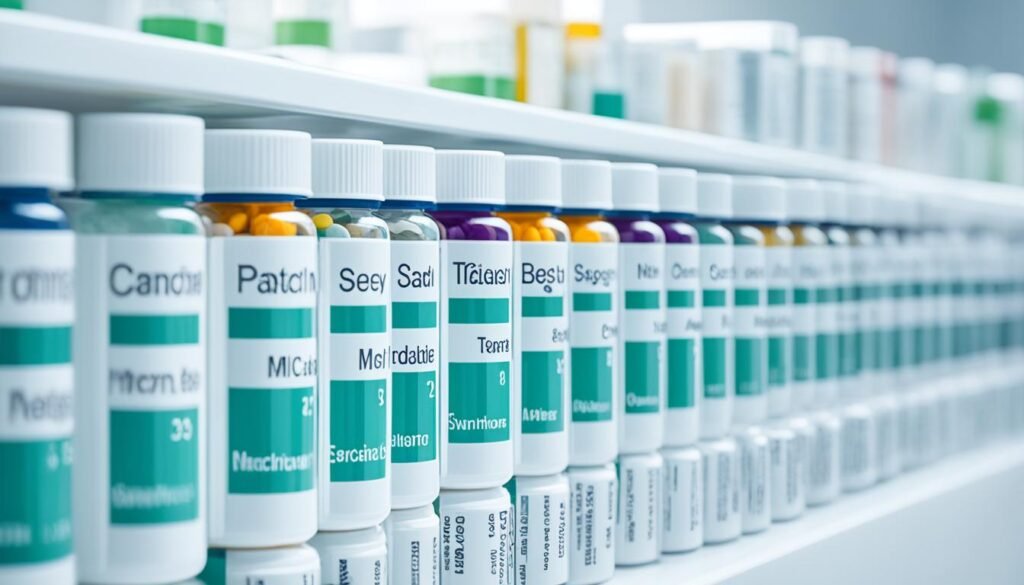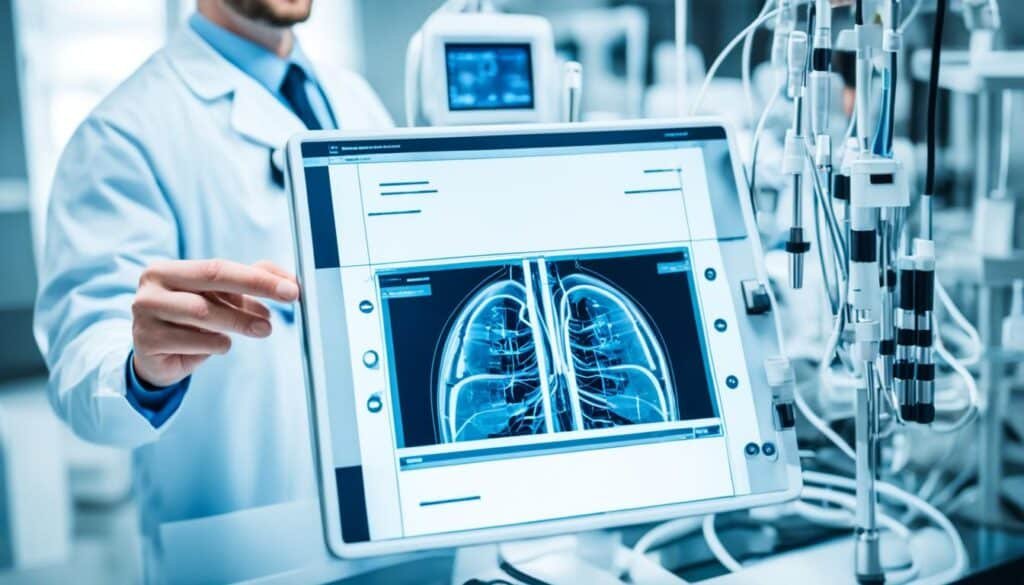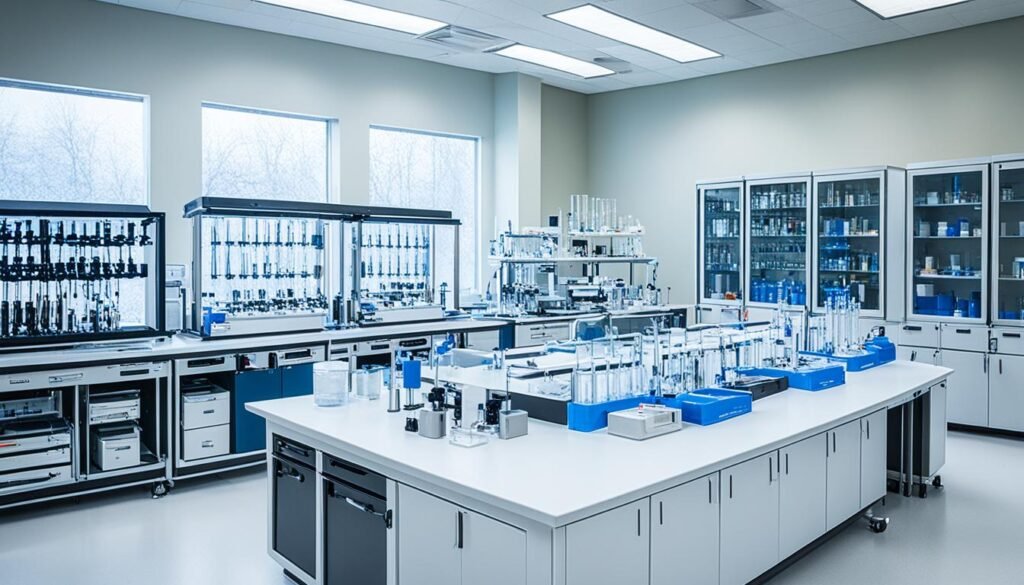A medical technician, also known as a medical technologist, plays a vital role in the healthcare sector, particularly in medical laboratories. They are skilled professionals responsible for conducting various laboratory tests, analyzing samples, and ensuring accurate diagnoses. In addition to performing these critical tests, medical technicians also play a significant role in maintaining equipment and adhering to rigorous safety protocols.
Medical technicians provide essential support to physicians and healthcare professionals, contributing to patient care and diagnostics. They work behind the scenes, conducting tests and analyzing samples to provide accurate information that helps healthcare providers make informed decisions regarding treatment and patient management.
The role of a medical technician is diverse and dynamic, evolving with advancements in technology and the changing landscape of healthcare. From traditional responsibilities, such as prescription management, to emerging roles, like patient-centric services and technology integration, medical technicians are instrumental in various aspects of healthcare delivery.
Key Takeaways:
- Medical technicians play a crucial role in the healthcare sector, primarily in medical laboratories.
- Their responsibilities include conducting laboratory tests, analyzing samples, and ensuring accurate diagnoses.
- Medical technicians provide essential support to physicians and healthcare professionals.
- They are responsible for maintaining equipment and adhering to safety protocols.
- The role of a medical technician is evolving, incorporating emerging responsibilities and technology integration.
The Traditional Role: Prescription Management
In the traditional role, medical technicians play a critical role in prescription management within healthcare settings. This encompasses a range of responsibilities, including sorting and labeling medications with utmost accuracy. Medical technicians must meticulously measure and dispense each pill, capsule, or liquid to ensure precise medication administration.
Furthermore, medical technicians are entrusted with the vital task of inventory maintenance. They diligently track medications, order supplies, and manage expiration dates to guarantee an efficient and well-stocked inventory. By meticulously managing the medication supply chain, medical technicians contribute to the seamless functioning of healthcare facilities and ultimately support optimal patient care.
Precision and attention to detail are paramount in prescription management. Medical technicians must adhere to strict protocols and regulations to ensure patient safety and minimize the risk of medication errors. Their expertise and commitment to accuracy serve as a crucial cornerstone in delivering reliable and effective pharmaceutical services.
The Importance of Sorting and Labeling Medications
Accurate sorting and labeling of medications are paramount to maintain patient safety and prevent medication errors. Medical technicians diligently organize medications to ensure that the right medications are delivered to patients at the appropriate time.
“The meticulous sorting and labeling of medications by medical technicians contribute to the efficient management of medication administration and ultimately enhance patient care.” – Dr. Emily Wilson, PharmD
Labeling medications accurately with clear instructions and proper dosage information aids healthcare professionals and patients in safe and effective medication use. Medical technicians’ attention to detail significantly reduces the risk of medication mix-ups, dosage errors, or potential adverse drug reactions.
Inventory Management: Tracking and Maintaining Supplies
Medical technicians fulfill a vital role in tracking and maintaining medication inventory. Diligently monitoring medication stock levels and expiry dates ensures a continuous supply of essential medications. By proactively managing inventory, medical technicians minimize the risk of medication shortages and stockouts that may jeopardize patient care.
Inventory management by medical technicians involves:
- Tracking medication levels to ensure an adequate supply for patients
- Ordering necessary medications, supplies, and equipment
- Rotating stock and effectively managing expiration dates
The organized and efficient management of medication inventory not only guarantees the availability of essential medications but also reduces waste and saves costs for healthcare institutions.
| Benefits of Effective Prescription Management | Examples |
|---|---|
| Improved patient safety | Preventing medication errors and adverse drug reactions |
| Enhanced medication adherence | Ensuring patients have access to the right medications at the right time |
| Cost savings | Optimizing inventory levels and minimizing waste |
| Efficient workflow | Supporting healthcare professionals in delivering timely care |
The Emerging Role: Patient-Centric Services

As healthcare continues to evolve, medical technicians are adapting and taking on new patient-centric roles to provide enhanced care and support. One of these emerging roles is medication synchronization, a program that aims to simplify medication management for patients.
In medication synchronization, medical technicians align a patient’s medications to a single refill date. This synchronization offers convenience and improves medication adherence by ensuring that patients have all their medications ready at the same time. By eliminating the need for multiple trips to the pharmacy, patients can experience fewer gaps in medication usage and better control over their health.
In addition to medication synchronization, medical technicians are also providing direct patient consultations. These consultations allow technicians to assist patients in selecting over-the-counter products that best suit their needs. They also educate patients on proper medication administration techniques, ensuring safe and effective usage.
By offering medication synchronization and direct patient consultations, medical technicians enhance patient satisfaction and contribute to overall healthcare efficiency. These services not only empower patients to better manage their medications but also free up pharmacists to focus on more complex clinical aspects of care.
Implementing patient-centric services through medication synchronization and direct consultations is a step forward in improving healthcare delivery and patient outcomes. As medical technicians continue to embrace these roles, they play a crucial part in enhancing patient care and promoting medication adherence.
The Silent Guardian: Quality Control

Medical technicians play a crucial role in ensuring quality control in the pharmacy by performing cross-checks and ensuring compliance with regulations. Through their diligent efforts, they help prevent medication errors and ensure patient safety.
One of the key responsibilities of medical technicians is to perform cross-checks to ensure that medication labels accurately match the prescription. By meticulously verifying the details, such as the medication name, dosage, and patient information, medical technicians help prevent errors that could have detrimental effects on patient health. This meticulous attention to detail is crucial in upholding high standards of medication safety and patient care.
Furthermore, medical technicians are the silent guardians of compliance and regulations in the pharmacy. They must adhere to strict guidelines and protocols to maintain the confidentiality of patient records and comply with legal and ethical standards. By maintaining the integrity of patient information and upholding privacy standards, medical technicians contribute to fostering trust and professionalism in the healthcare industry.
Quality control is paramount in the pharmacy to ensure that patients receive the correct medications and dosage, mitigating the risk of adverse reactions. Medical technicians’ role in cross-checking the accuracy of medication labels and complying with regulations significantly reduces the likelihood of medication errors and safeguards patient well-being.
“As medical technicians, we take our responsibility of quality control seriously. Our cross-check systems and adherence to compliance and regulations are crucial in preventing medication errors and ensuring patient safety.”
– John Smith, Registered Medical Technician
Medical technicians’ commitment to quality control, compliance, and regulations helps create a safe and reliable environment in the pharmacy. Their meticulous attention to detail and adherence to protocols are essential in ensuring accurate medication dispensing and upholding patient safety standards.
Importance of Quality Control in the Pharmacy
Quality control in the pharmacy is vital to prevent medication errors, protect patients’ well-being, and maintain the reputation of healthcare institutions. The table below illustrates the significant impact of quality control in enhancing patient safety:
| Benefits of Quality Control | Effects of Lack of Quality Control |
|---|---|
|
|
The Future of Quality Control: Embracing Technology
Technology plays a crucial role in enhancing quality control processes in the pharmacy. Automated systems and electronic records support medical technicians in their efforts to ensure accuracy and compliance. These technologies enable efficient cross-checking and seamless integration with regulatory systems, contributing to improved patient safety.
The role of medical technicians in quality control is evolving with the integration of software systems that enable real-time verification, streamlined inventory management, and comprehensive compliance tracking. These advancements not only enhance precision and efficiency but also facilitate thorough documentation, enabling healthcare institutions to meet regulatory requirements with ease.
As the pharmacy landscape continues to advance, medical technicians’ role as quality control guardians remains integral to upholding patient safety, compliance with regulations, and the highest standards of pharmaceutical care.
The Digital Frontier: Technology and Automation

As the healthcare industry continues to evolve, medical technicians are embracing the digital frontier and leveraging technology and automation to enhance their roles. With the integration of advanced software systems in pharmacies, medical technicians are empowered with new capabilities and streamlined workflows.
One of the significant areas where technology has made a profound impact is in the management of e-prescriptions and data. Medical technicians now handle e-prescriptions seamlessly, ensuring secure transmission and safeguarding patient data. This automated process not only eliminates the need for manual prescription management but also reduces errors and enhances efficiency.
Moreover, medical technicians interact with sophisticated software systems that automate drug dispensing, allowing for more accurate medication administration and reducing the risk of errors. These systems keep track of inventory, ensuring efficient supply management and preventing medication shortages.
In addition to e-prescriptions and drug dispensing, medical technicians also play a crucial role in data management. They utilize software platforms to manage patient records, ensuring that information is digitally stored and easily accessible. This digital approach enhances the organization and efficiency of healthcare facilities, enabling healthcare providers to make informed decisions based on comprehensive and up-to-date patient data.
“Technology and automation have transformed the way medical technicians work. We now have advanced tools to manage e-prescriptions and data, allowing us to provide more accurate and efficient services to patients.”
– Medical Technician
Additionally, technology facilitates telepharmacy consultations, enabling medical technicians to communicate remotely with patients, providing guidance on medication use, answering questions, and offering support. This remote service is particularly valuable for patients in rural or underserved areas, who may face challenges accessing in-person healthcare services.
The integration of technology and automation in the role of medical technicians has revolutionized the way they deliver healthcare services. By leveraging sophisticated software systems, medical technicians provide specialized and efficient care, ensuring accurate prescription management, secure data transmission, and streamlined workflows.
The Advantages of Technology and Automation for Medical Technicians
The adoption of software systems and automation by medical technicians offers several key advantages:
- Improved accuracy and efficiency in prescription management
- Enhanced medication administration and reduced errors
- Efficient supply management, reducing the risk of medication shortages
- Secure transmission and safeguarding of patient data
- Streamlined workflows and improved organization of patient records
- Remote access and telepharmacy consultations for enhanced patient support
By harnessing the power of technology, medical technicians are maximizing their potential and contributing to the advancement of healthcare delivery.
Medical Technologist: A Vital Team Player In Healthcare

A medical technologist is a highly trained professional in the field of clinical laboratory science. They play a crucial role in supporting accurate diagnoses, effective treatment, and prevention strategies in healthcare settings.
Medical technologists have a range of responsibilities that involve collecting and analyzing body fluids and tissue samples. Through their expertise in laboratory testing, they provide crucial information to physicians for decision making in patient care.
Specializing in various subspecialties, medical technologists bring valuable insights and skills to their roles. Clinical chemistry focuses on chemical analysis, while hematology involves the study of blood and blood disorders. Immunohematology encompasses blood typing and compatibility testing, and microbiology involves the identification and analysis of microorganisms.
| Subspecialties | Responsibilities |
|---|---|
| Clinical Chemistry | Performing chemical analysis of body fluids to measure components such as glucose, electrolytes, and enzymes |
| Hematology | Studying blood cells and disorders, including conducting blood cell counts, identifying abnormalities, and interpreting results |
| Immunohematology | Performing blood typing and compatibility testing for blood transfusions, ensuring the safety and efficacy of transfusion procedures |
| Microbiology | Identifying and analyzing microorganisms, such as bacteria and fungi, to diagnose and treat infectious diseases |
By specializing in these subspecialties, medical technologists contribute to accurate diagnoses, which are vital for effective patient care. They provide healthcare professionals with essential information that shapes treatment plans, monitors disease progression, and helps prevent future health complications.
Medical technologists are truly essential team players in healthcare, working behind the scenes to ensure accurate laboratory testing and analysis. Their expertise and dedication make a significant impact on patient outcomes and the overall quality of healthcare.
Medical Technologist vs. Lab Technician: Understanding the Difference

In the field of medical laboratory science, it is crucial to distinguish between the roles of a medical technologist and a lab technician. While both occupations play essential roles in ensuring accurate laboratory test results, they differ in terms of education, training, and responsibilities.
Medical Technologists
Medical technologists have a higher level of education and typically hold a bachelor’s degree in medical laboratory technology or a related field. They undergo specialized training that equips them with in-depth knowledge of laboratory procedures, scientific principles, and advanced diagnostic techniques.
Medical technologists perform complex laboratory tests, analyze samples, and interpret results using their extensive scientific background. They handle sophisticated laboratory equipment and follow strict protocols to ensure accuracy and precision in their work. Due to their higher level of education and specialized training, medical technologists often have more autonomy and take on leadership roles within the laboratory.
Moreover, medical technologists are responsible for maintaining quality control measures, ensuring the accuracy and reliability of laboratory test results. They may also oversee the work of lab technicians and provide guidance when needed.
Lab Technicians
In contrast, lab technicians generally have a lower level of education, such as an associate’s degree or a certificate in medical laboratory science. They perform routine tests and procedures under the supervision of medical technologists or laboratory scientists.
Lab technicians focus on conducting basic laboratory tests, handling equipment, and processing samples according to established protocols. They play a crucial supportive role by performing tasks like specimen collection, sample preparation, and data entry. Lab technicians follow precise instructions and guidelines provided by medical technologists, ensuring accurate and timely results.
Lab technicians are also responsible for maintaining cleanliness and organization within the laboratory, managing inventory, and documenting procedures for quality control purposes.
“Medical technologists possess advanced scientific knowledge and skills, enabling them to perform complex tests and contribute to accurate diagnoses, while lab technicians provide vital support by conducting routine tests and ensuring smooth laboratory operations.”
Comparison
To summarize the differences between medical technologists and lab technicians:
| Aspect | Medical Technologist | Lab Technician |
|---|---|---|
| Education | Bachelor’s degree in medical laboratory technology or related field | Associate’s degree or certificate in medical laboratory science |
| Training | Specialized training in advanced laboratory techniques and scientific principles | Training in basic laboratory procedures and protocols |
| Responsibilities | Performing complex laboratory tests, analyzing samples, maintaining quality control | Conducting routine tests, handling equipment, supporting medical technologists |
| Supervision | Often oversee the work of lab technicians | Work under the supervision of medical technologists or laboratory scientists |
While medical technologists and lab technicians have distinct roles, they work collaboratively to ensure accurate diagnostic results and quality patient care. Medical technologists depend on lab technicians for reliable and efficient execution of routine laboratory tests, providing a foundation for accurate diagnoses and optimal patient outcomes.
Required Skills and Education for Medical Technologists

Medical technologists play a crucial role in the field of healthcare, utilizing their knowledge and expertise to perform complex laboratory tests and provide accurate diagnostic information. To excel in their profession, medical technologists require a strong educational background, specialized training, and specific skills. Here are the key requirements for aspiring medical technologists:
Educational Background
Medical technologists typically hold a bachelor’s degree in medical laboratory science or a related field. This degree provides them with a solid foundation in the scientific principles and techniques required for laboratory testing. The curriculum includes courses in biology, chemistry, microbiology, and other relevant subjects that equip them with the necessary knowledge and skills.
Certified Programs
Completing a certified program approved by the National Accrediting Agency for Clinical Laboratory Sciences (NAACLS) is a crucial step for aspiring medical technologists. These programs provide hands-on training and practical experience in laboratory techniques, ensuring that graduates are well-prepared for the demands of the profession. Students gain valuable experience through clinical rotations in various laboratory settings.
Certification
Obtaining certification is a vital requirement for medical technologists, as it verifies their competence and adherence to industry standards. Certification requirements may vary by location, but most often involve passing a national certification exam. One well-known certification for medical technologists is the American Society for Clinical Pathology (ASCP) Medical Laboratory Scientist (MLS) certification. Having this certification demonstrates a high level of proficiency and dedication to the profession.
Essential Skills
To thrive as a medical technologist, individuals must possess a set of essential skills that enable them to perform their duties effectively. These skills include:
- Sharp analytical skills: Medical technologists must be able to analyze and interpret complex laboratory test results with precision and attention to detail.
- Proficiency in laboratory techniques: They should have a strong understanding of laboratory equipment and techniques, ensuring accurate and reliable test results.
- Effective communication skills: Medical technologists often collaborate with physicians, nurses, and other healthcare professionals. Clear and concise communication is essential for conveying test results and participating in multidisciplinary discussions.
By possessing the necessary education, training, skills, and certification, medical technologists are well-equipped to contribute to the healthcare field. Their expertise and dedication form the foundation of accurate diagnostic testing, supporting physicians in making informed decisions and ultimately improving patient care.
Responsibilities and Subspecialties of Medical Technologists

Medical technologists play a crucial role in clinical pathology, with a diverse range of responsibilities. They perform various laboratory tests on body fluids and tissues, analyzing chemical components, cell counts, and other indicators. These tests are essential for diagnosing and monitoring diseases, disorders, and infections, providing vital information for effective patient care.
Medical technologists can specialize in different subspecialties within clinical pathology, focusing on specific types of laboratory testing and analysis. Some of the common subspecialties include:
- Clinical Chemistry: Medical technologists specialized in clinical chemistry analyze bodily fluids to measure the levels of various chemicals and markers, helping in the diagnosis and monitoring of metabolic disorders, hormone imbalances, and other conditions.
- Hematology: Medical technologists specializing in hematology study blood samples to examine the quantity, structure, and functionality of blood cells. They play a crucial role in detecting blood disorders, such as anemia and leukemia.
- Immunohematology: Medical technologists in immunohematology focus on blood compatibility and transfusion medicine. They identify and match blood types, perform cross-matching tests, and ensure safe blood transfusions.
- Microbiology: Medical technologists specializing in microbiology work with microbial cultures to identify the presence of bacteria, viruses, fungi, and parasites. This subspecialty plays a critical role in diagnosing infectious diseases and determining the appropriate treatment.
By specializing in these subspecialties, medical technologists gain in-depth knowledge and expertise in specific areas of laboratory testing, contributing to accurate diagnoses and effective patient care.
| Responsibilities | Subspecialties |
|---|---|
| Conduct laboratory tests on body fluids and tissues | All subspecialties |
| Analyze chemical components, cell counts, and other indicators in body samples | All subspecialties |
| Specialize in clinical chemistry | Clinical Chemistry |
| Specialize in examining blood samples and identifying blood disorders | Hematology |
| Focus on blood compatibility and transfusion medicine | Immunohematology |
| Work with microbial cultures and identify infectious agents | Microbiology |
The responsibilities and subspecialties of medical technologists highlight their integral role in clinical pathology, ensuring accurate diagnoses and effective patient care. Their expertise and contributions play a critical part in the healthcare system, supporting the well-being of patients and the overall quality of healthcare delivery.
Importance of Medical Technologists in Healthcare

Medical technologists play a vital role in healthcare, making significant contributions to accurate diagnoses, patient care, and overall healthcare quality. Through their expertise in conducting laboratory tests and analysis, medical technologists support physicians and healthcare professionals in providing effective treatment and prevention strategies.
Accurate diagnoses are crucial for guiding appropriate medical interventions and ensuring positive patient outcomes. Medical technologists utilize their specialized knowledge and skills to perform a wide range of laboratory tests on body fluids and tissues. By analyzing chemical components, cell counts, and other indicators, they provide crucial information that aids physicians in making informed decisions about patient care.
“The work of medical technologists supports accurate diagnoses, effective treatment and prevention strategies, and overall patient care.”
Moreover, medical technologists contribute to patient safety and disease control efforts, particularly in challenging situations like the current COVID-19 pandemic. They play a crucial role in conducting tests and analyzing samples to detect and monitor infectious diseases, helping to identify outbreaks and prevent their spread. By ensuring accurate and timely information, medical technologists enable healthcare professionals to take necessary precautions and implement appropriate interventions.
Effective patient care requires comprehensive and reliable data, and medical technologists excel in providing accurate and precise laboratory test results. Their meticulous approach, attention to detail, and adherence to protocols help minimize errors and ensure the reliability of diagnostic information. This, in turn, enhances patient care by enabling healthcare professionals to make evidence-based decisions and tailor treatment plans to individual patients.
Overall, the expertise and dedication of medical technologists are essential in maintaining healthcare standards and improving patient outcomes. Their role in providing accurate laboratory tests, supporting accurate diagnoses, and contributing to patient care cannot be overstated. As healthcare continues to evolve, the importance of medical technologists in ensuring the quality and effectiveness of healthcare services remains paramount.
Also Read: Medical Certificate: Your Guide to Official Health Docs
Conclusion
Medical technologists are instrumental in providing essential patient care and accurate diagnostic testing in the healthcare sector. Through their expertise, they perform complex laboratory tests, analyze samples, and deliver vital information to healthcare professionals. With their unwavering dedication, medical technologists contribute to patient safety and play a pivotal role in improving overall healthcare outcomes.
By ensuring accurate diagnoses, medical technologists enable healthcare providers to make informed decisions for effective treatment and prevention strategies. Their commitment and proficiency in diagnostic testing play a vital part in enhancing patient care and facilitating timely interventions. In this ever-evolving field of medical technology, medical technologists are the unsung heroes who tirelessly work behind the scenes, making a significant difference in the lives of patients.
As the healthcare industry continues to advance, the role of a medical technologist remains indispensable. Their expertise, precision, and attention to detail are vital for accurate laboratory testing and analysis. Medical technologists’ contributions go beyond the laboratory walls; they actively contribute to the improvement of healthcare quality, patient safety, and disease control efforts. Their invaluable support ensures that healthcare professionals have the necessary insights to deliver optimal care and improve patient outcomes.
FAQs
Q: What is the job description of a medical technician?
A: A medical technician’s job involves assisting in medical laboratories by collecting samples, conducting tests, and analyzing results under the supervision of technologists or doctors.
Q: How can someone become a medical technician?
A: To become a medical technician, one typically needs to complete an associate degree program in medical technology or a related field, followed by on-the-job training.
Q: What is the average salary for a medical technician?
A: According to the Bureau of Labor Statistics, the average salary for a medical technician is around $52,330 per year.
Q: What are the responsibilities of a medical technician?
A: Responsibilities include performing laboratory tests, maintaining equipment, documenting results, and ensuring the accuracy of test results.
Q: What is the career path like for a medical technician?
A: Medical technicians often start their careers with on-the-job training and can advance to become medical technologists with further education and experience.
Q: What is the work environment typically like for medical technicians?
A: Medical technicians usually work in medical and diagnostic laboratories, hospitals, or physician’s offices, and may be required to handle potentially infectious materials.
Q: What are some common tasks performed by medical technicians?
A: Medical technicians may collect blood samples for testing, perform phlebotomy procedures, analyze bodily fluids, and operate lab equipment.
Q: How does one learn what a medical technician does?
A: You can learn about the duties of a medical technician by attending allied health schools, completing coursework in medical technology, and gaining hands-on experience in a clinical setting.




